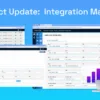JD Edwards EnterpriseOne is one of the leading enterprise resource planning (ERP) tools available. It’s an integrated applications suite of comprehensive enterprise resource planning software that combines business value, standards-based technology, and deep industry experience into a business solution (1).
PortX has created the JD Edwards Connector (JDE Connector) on the Mulesoft Anypoint platform to enable organizations to fully integrate JD Edwards EnterpriseOne with any other legacy system, DBMS, ERP, SCM, or CRM application – to any platform. The JDE Connector provides high-speed, low-impact access, and ease-of-use to expose all business logic and data contained within JD Edwards EnterpriseOne for reuse.
The JDE Connector offers these benefits:
- Collaboration between trading partners to lower the cost of doing business and increase competitiveness.
- Multiple systems can be linked together to share information in a real-time manner, delivering time-sensitive information to those who need it.
- Disparate solutions as the result of mergers or acquisitions can be quickly incorporated into the enterprise’s information technology solution.
How the JD Edwards Connector Works
The JDE Connector is developed over Oracle’s JD Edwards Dynamic Java Connector and Oracle’s JD Edwards EnterpriseOne XML solution. This meets these three important business objectives:
- Flexibility, Options, and Choice: The developer can make the right choice for the particular environment and needs.
- Investment Preservation: You will benefit from our ongoing upgrades and improvements to that architecture.
- Manageability: This JDE Connector is designed to make the interoperability process easily managed.
With Mule ESB and the JDE Connector, it becomes much faster and easier to integrate JD Edwards EnterpriseOne with other applications like Databases, Salesforce.com, Workday and B2B/EDI. Mulesoft provides Anypoint Studio, a single graphical design environment that accelerates developer productivity. The JDE Connector was developed to provide bi-directional connectivity between JDE EnterpriseOne and other applications or tools. Using the JDE Connector, you can easily invoke Business Functions, generate JDE transactions, Invoke EDI, execute UBE processes, and check UBE status.
Below, are two examples of how Anypoint Studio plus the JDE Connector makes life easy for the developer:
How to expose a BSFN as Restful service using the JDE Connector for Mule ESB
First, select the JDE Connector component and drag it into a flow.
Next, create a configuration to JDE EnterpriseOne. You need to provide login information for the JDE user: Username, Password, Environment, and Role.
How to define the operation to invoke a BSFN
First, choose the operation Call Object.
Next, enter the BSFN name.
With this information, JDE Connector retrieves the business function metadata from the JD Edwards EnterpriseOne server and shows the dialog to allow you to easily enter the values needed by the BSFN.
How to return the value from the BSFN and deploy the development
After the above steps, any external system can invoke a restful service to retrieve information from JD Edwards EnterpriseOne.
Watch how easy it is to Call an Object using the JDE Connector:
How to invoke a Universal Batch Engine (UBE)
You just use the Submit batch process operation on the JDE Connector. This illustration below shows the steps:
First, enter Operation Submit batch process
Next, enter the UBE Name and Version. With UBE/Version, JDE Connector retrieves Report Interconnect metadata for that UBE.
Lastly, you will need to open the dialog to to enter the values needed to invoke the UBE. You can override the Job Queue and enter the values for the Report Interconnect for the report you will submit. You can retrieve the JobId generated for this call of the UBE. This value will be used by the next operation Get Batch process information, Get Job Status.
The JDE Connector allows you to take advantage of your existing JDE knowledge. Today, integration between your ERP and other systems is essential and, as you can see, with the JDE connector, such a solution is easy to learn and easy to use. It saves the time and headache compared to traditional solutions that are complex, requiring multiple tools and unique skillsets, saving your company thousands in training and maintenance costs.
If you would like additional information, please visit the JDE Connector product page on our site here. Thank you!
————
(1) Footnote Source: Oracle (2015). JD Edwards EnterpriseOne. Retrieved from the Oracle website










